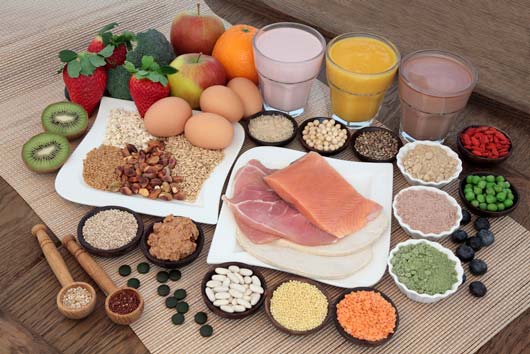
Home > Why Protein?

Protein shakes, protein balls, protein powder, protein supplements.. seems the world has gone a bit mad when it comes to protein.
Protein shakes, protein balls, protein powder, protein supplements.. seems the world has gone a bit mad when it comes to protein. But why? Whilst we don’t necessarily advocate the above products, the fact is that protein is one of the most essential nutrients. It contributes very heavily in key body functions such as the production of hormones and enzymes, immune responses and cell repair, and nobody consumes enough of it! Protein is the essential building block in blood, skin, cartilage, bone and muscles. It is a macronutrient, which means the body needs large amounts of it and since the body does not store protein, it is important to be consuming it in our diet every day.
The best sources of protein come from animal sources. These include red meat, poultry, game, fish, eggs and dairy. Protein can also be obtained from plant based sources such as nuts, seeds, legumes, pulses, soy and wholegrains. The quality of the protein is determined by the essential amino acids it contains. Most plant based proteins are missing at least one of the essential amino acids, so it is important to mix plant proteins to make up the full complement of amino acids. Amino acids once broken down are used in many ways in the body such as:
How much protein do we actually need?
There is relatively little solid evidence on the ideal amount of protein in a diet. Women generally require about 0.75 grams per kilogram of body weight per day and a man needs around 0.84 grams per kilogram of body weight per day. This seems like a very low recommendation. The body loses about 23 grams of protein a day normally. Most medical professionals believe at least 1 gram of protein per kilogram of body weight is required daily for healthy adults. We have also established guidelines for increasing protein intake. Protein requirements are greatest during growth periods in children (depending on their age), adolescents and pregnancy. During these times, protein intake can be increased to 1.2 grams of protein per kilogram of body weight per day. Your protein intake should make up around 10-35% of your total daily calories, depending on how active you are.
What happens if we don’t eat enough protein?
Protein actually provides satiety. It helps us stay full for longer. Studies have shown that people who don’t consume enough protein overeat – perhaps its nature’s way as we attempt to find essential amino acids through other foods. Make sure to include protein at every meal so that you are sufficiently satisfied and do not overeat throughout the day.
Here are some examples of the protein content of some foods:
| Food per 100 grams | Total protein |
| Fillet steak, grilled | 28g |
| Chicken breast, grilled | 25g |
| Fish fillet, snapper | 21g |
| Kangaroo steak, grilled | 29g |
| Red salmon, canned | 20.3g |
| Tuna in springwater, canned | 17.8g |
| Eggs | 13.2g |
| Soy beans | 8.6g |
| Tofu | 9.5g |
Amy McKendrick, Nutritionist, @mynutritioncoach
Book a complimentary consultation with our Aesthetic & Wellness Therapists. During your complimentary consultation, your body expert will help answer any questions you may have about the technology and treatment process. From there, we will work with you to customise and recommend the best treatment program options to help you achieve your body goals.
Not sure which treatment is best for you? Call us today and speak with our Aesthetic & Wellness Therapists to discuss your body goals.
New here? Sign up to receive a welcome freebie on us!
© Body Catalyst 2023






@ Body Catalyst 2023